
Here’s a recording in a mystery language.
Do you know or can you guess the language, and do you know where it’s spoken?

Here’s a recording in a mystery language.
Do you know or can you guess the language, and do you know where it’s spoken?
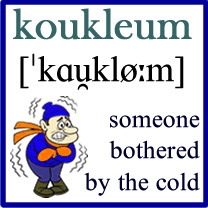
Are you a shivery type? Or maybe a heat freak? Or in other words, do you prefer warmer temperatures, and turn up the heating when it gets cold?
If so, then you could call yourself a koukleum [ˈkɑu̯kløːm], a Dutch word meaning a “person who is often/easily cold, person bothered by the cold a lot” [source], or a ‘shivery type’ [source]. It comes from kou (a low temperature situation) and kleumen (to be stiff with cold) [source].
Related words include:
The German word Frostbeule has a similar meaning to koukleum, and also means frostbite or chilblain [source].
A koukleum might suffer from cryophobia (an abnormal fear of ice or frost; a morbid fear of freezing) [source], and might be a cryophobic, which is the nearest English word I can find.
The opposite of cryophobic is cryophilic, which usually refers to plants or animals and means “having an affinity for or thriving at low temperatures; able to thrive at low temperatures” [source].
According to this article, about 20% of people have a genetic mutation which makes them better able to resist cold temperatures and to live in cold climates.
I’m not a koukleum, and in fact prefer cooler temperatures. I haven’t found a word for this preference in Dutch, English or other languages. How about you?

Here’s a recording in a mystery language.
Do you know or can you guess the language, and do you know where it’s spoken?

If you’re a ‘big cheese‘, you’re an important, successful, or influential person, and/or you have an important and powerful position in an organization. Alternatively you might be called, or call yourself, a big fish, big gun, big noise, big shot, or big wheel [source].
Apparently the word cheese was used in the 19th century to mean something that was good, genuine, pleasant or advantageous. In John Camden Hotten’s The Slang Dictionary of 1863 it is defined as:
Cheese, anything good, first-rate in quality, genuine, pleasant, or advantageous, is termed the cheese. The London Guide, 1818, says it was from some young fellows translating “c’est une autre chose” into “that is another cheese.” But the expression cheese may be found in the Gipsy vocabulary, and in the Hindostanee and Persian languages. In the last chiz means a thing—that is the thing, i.e., the cheese.
In Urdu چیز (cheez) does mean thing [source]. The same word in Persian (Farsi) means article, entity, item, matter, object, stuff or thing [source]. In Hindi चीज (cīj) means thing, matter, object or concern [source].
Some other interesting cheese-related from the The Slang Dictionary include:
Cheese, or cheese it (evidently a corruption of cease), leave off, or have done; “cheese your barrikin,” hold your noise. Term very common.
Cheesecutter, a prominent and aquiline nose. Also a large square peak to a cap. Caps fitted with square peaks are called cheesecutter caps.
Cheesy, fine or showy. The opposite of “dusty.”
Nowadays the meaning of cheesy has changed a bit, and means “vulgarly pretentious or sentimental”, “banal, trite or in poor taste” or “inferior, cheap and shoddy” [source].
The expression big cheese first appeared in O. Henry’s 1910 novel Unprofessional Servant in which it meant ‘wealth or fame’. The meaning of an important person first appears in The Olean Evening Times in June 1922 as, “The big mayor of Olean fair, You’re the big cheese on the scene.” [source].
In Swedish the equivalent of a big cheese is le stort, or a ‘big smile’, which certainly makes me smile.
What about in other languages?
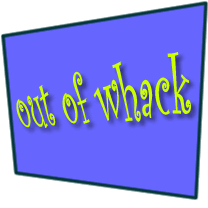
Have you ever heard or read of something being out of whack? Or maybe you use this expression yourself. If so, have you wondered what a whack might be and how you can be out of one?
Well, the other day I saw this phrases in an email and it got me thinking about where it comes from, and also whether there’s a positive version of it.
According to the Free Dictionary, out of whack means:
According to World Wide Words, whack may be onomatopoeic origin, and may have developed from thwack. In the 18th century it meant “a share of a booty obtained by fraud” and was originally thieves’ slang, according to Francis Grose’s 1785 A Classical Dictionary of the Vulgar Tongue. He also mentions a Paddy whack, which he defines as a “stout brawny Irishman”.
Paddywhack also means an appearance in the traditional English nursery rhyme and counting song This Old Man:
This old man, he played one,
He played knick-knack on my thumb;
With a knick-knack paddywhack,
Give the dog a bone,
This old man came rolling home.
It doesn’t appear to have anything to do with Irishmen in this case, but just fits with the tune and the rhyme.
Other phrases featuring whack include:
Then there’s in fine whack, which was apparently used in the 19th century to mean “in good condition or excellent fettle”. So there is a positive version of out of whack.
The word wacky / whacky apparently comes from whack, and means “someone who whacked their head onto something often, hence being weird” [source]
Are you feeling in fine whack, or are things a bit out of whack for you?
Do you have other ways to say something is out of whack or in in fine whack?

Here’s a recording in a mystery language.
Do you know or can you guess the language, and do you know where it’s spoken?
Do you like to twankle?
You might be wondering what twankling involves, and whether you go do it without realising. Here are some possible definitions. Can be guess which one is the real one?
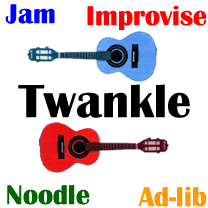
According to Wiktionary, twankle means “to twang with the fingers on a music instrument”. Another definition is “to play idly on a musical instrument”.
So, if you have a musical instrument lying around, and who doesn’t*, you may have twankled on it without knowing. Although maybe you would say that you were jamming, noodling, improvising, ad-libbing or composing. Do you have any other words for this?
*As I write this, I currently have several instruments lying around in easy reach – a cavaquinho, ocarinas, tin whistles, recorders, a roll-up piano, a melodica, a guitar, a bodhrán and a ukulele – and I have been known to twankle on them. Until I learnt this word though, I noodled on them. Other instruments are available elsewhere in my house.
In fact, here’s a tune called The Wagtail that emerged from some twankling / noodling on the cavaquinho a few weeks ago:
I will make a better recording soon, and may even write out the dots as well.
A Dutch friend included the expression sniding wind in a poem she wrote today:
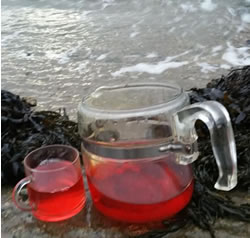
Tea by the sea
A sniding wind
comes from the east
It blows through
All my layers
Making my hands
Go cold and colder
White frotty waves
Black seaweed
Pink tea gone cold too
Quick rush back home
On my cloggerdy clogs
More Tea by the sea poems.
After writing it, she realised that sniding wind was an Anglified version of the Dutch expression snijdende wind (cutting wind).
While sniding doesn’t exist in English, the word snide [snaɪd] does, and means “disparaging or derisive in an insinuative way” and “tricky, deceptive, false, spurious, contemptible” [source].
Snide comes from snithe [snʌɪð / snaɪð] (sharp, cutting, cold, piercing (wind/weather)), from the Middle English snithen, from the Old English snīþan (to cut, lance, hew, reap, mow), from the Proto-Germanic *snīþaną (to cut), from the Proto-Indo-European *sneyt- (to cut) [source]. So it could have been a snithing wind – it certainly was yesterday.
The Dutch word snijden (to cut, carve, intersect) comes from the same root, as does the German word schneiden (to cut, trim, slice), the Swedish word snida (to carve, engrave), the Icelandic word sníða (to trim, tailor).

Here’s a recording in a mystery language.
Do you know or can you guess the language, and do you know where it’s spoken?
An interesting word I learnt the other day while listening to the Something Rhymes with Purple podcast was scribacious, which means “prone to excessive writing” [source], “having the tendency to write a lot or too much“ [source], or “addicted to writing, fond of writing” [source].
Scribacious comes from scribe (someone who writes), from the Middle English scribe, from the Old French scribe (scribe), from the Late Latin scriba (secretary), from scribere (to write, draw (up), draft, scratch).
Are there any other words that mean “fond of writing”?
Some related words include:
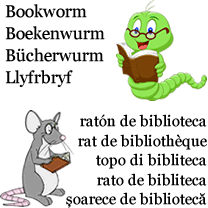
One who is fond of reading might be called bookish, a bookworm or a bibliophile. Do you know any other words for this?
In Dutch a bookworm is a boekenwurm [source], and similarly in German a bookworm is a Bücherwurm [source].
In Spanish a bookworm is a ratón de biblioteca (a library mouse), a ratón de archivo (an archive mouse), a gusano de libro (a bookworm) [source].
In French a bookworm is a rat de bibliothèque (a library rat) or a dévoreur de livres (a devourer of books) [source].
In Italian a bookworm is a topo di bibliteca (a library rat/mouse) [source].
What about in other languages?